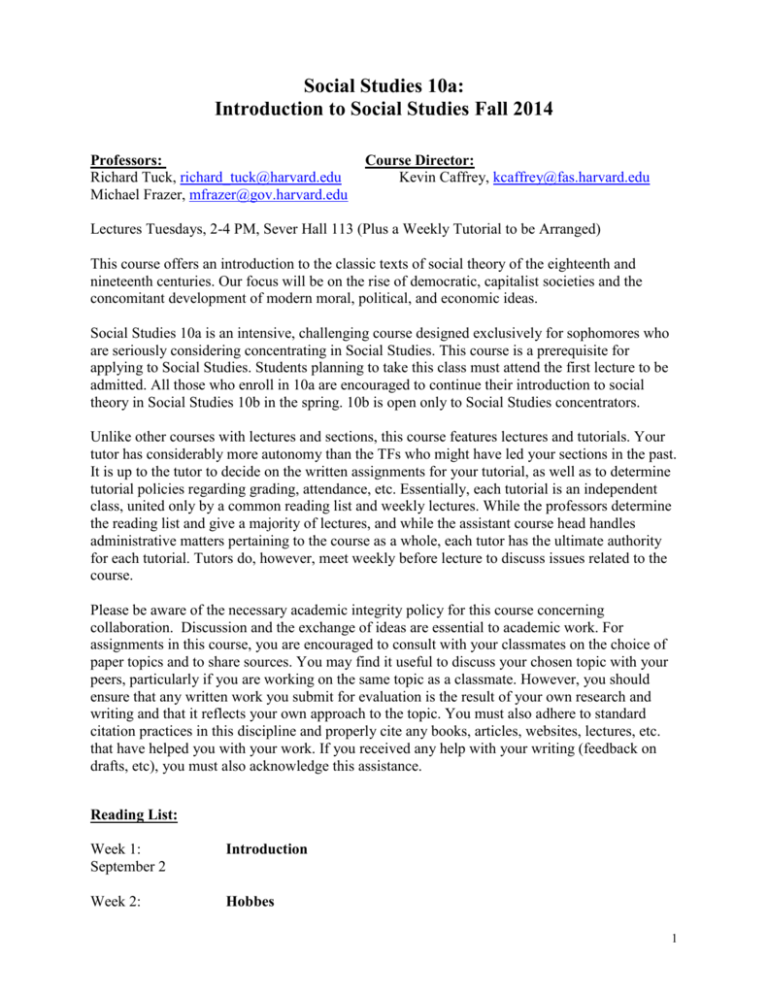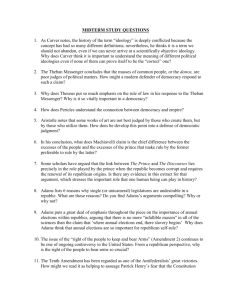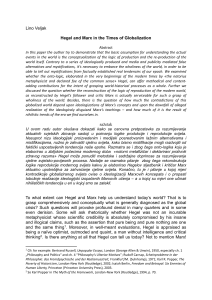ss10a_syllabus_fall_2014
advertisement

Social Studies 10a: Introduction to Social Studies Fall 2014 Professors: Richard Tuck, richard_tuck@harvard.edu Michael Frazer, mfrazer@gov.harvard.edu Course Director: Kevin Caffrey, kcaffrey@fas.harvard.edu Lectures Tuesdays, 2-4 PM, Sever Hall 113 (Plus a Weekly Tutorial to be Arranged) This course offers an introduction to the classic texts of social theory of the eighteenth and nineteenth centuries. Our focus will be on the rise of democratic, capitalist societies and the concomitant development of modern moral, political, and economic ideas. Social Studies 10a is an intensive, challenging course designed exclusively for sophomores who are seriously considering concentrating in Social Studies. This course is a prerequisite for applying to Social Studies. Students planning to take this class must attend the first lecture to be admitted. All those who enroll in 10a are encouraged to continue their introduction to social theory in Social Studies 10b in the spring. 10b is open only to Social Studies concentrators. Unlike other courses with lectures and sections, this course features lectures and tutorials. Your tutor has considerably more autonomy than the TFs who might have led your sections in the past. It is up to the tutor to decide on the written assignments for your tutorial, as well as to determine tutorial policies regarding grading, attendance, etc. Essentially, each tutorial is an independent class, united only by a common reading list and weekly lectures. While the professors determine the reading list and give a majority of lectures, and while the assistant course head handles administrative matters pertaining to the course as a whole, each tutor has the ultimate authority for each tutorial. Tutors do, however, meet weekly before lecture to discuss issues related to the course. Please be aware of the necessary academic integrity policy for this course concerning collaboration. Discussion and the exchange of ideas are essential to academic work. For assignments in this course, you are encouraged to consult with your classmates on the choice of paper topics and to share sources. You may find it useful to discuss your chosen topic with your peers, particularly if you are working on the same topic as a classmate. However, you should ensure that any written work you submit for evaluation is the result of your own research and writing and that it reflects your own approach to the topic. You must also adhere to standard citation practices in this discipline and properly cite any books, articles, websites, lectures, etc. that have helped you with your work. If you received any help with your writing (feedback on drafts, etc), you must also acknowledge this assistance. Reading List: Week 1: September 2 Introduction Week 2: Hobbes 1 September 9 Thomas Hobbes, Leviathan, Chs. 13, 14, 15 (on website) Thomas Hobbes, Elements of Law, Book II, Ch.10, §8 (on website) Week 3: September 16 Rousseau Jean-Jacques Rousseau, Basic Political Writings (Hackett) “Discourse on the Origin of Inequality,” pp. 25-81 “On the Social Contract,” pp. 141-227 Week 4: September 23 Adam Smith I David Hume, An Enquiry Concerning the Principles of Morals (Oxford Philosophical Texts) Section 1 – Section 5 (pp. 73-118) Conclusion – Appendix 3 (pp. 145-175) Adam Smith, The Theory of Moral Sentiments (Liberty Classics) Part I, pp. 9-26, 50-66 Part II, pp. 67-71, 82-92 Part III, pp. 109-113, 126-131, 149-150, 171-178 Part IV, pp. 179-193 Part VI, pp. 212-217, 227-237 Part VII, pp. 265-266 Week 5: September 30 Smith II Adam Smith, Wealth of Nations (Liberty Classics) Book I: Ch. 1-2 (all); Ch. 3: §1-2; Ch. 4: §1-4, 13-18; Ch. 5: §1-10; Ch. 6: §1-9; Ch. 7: all; Ch. 8: §1-28, 36-48; Ch. 9: §10-11, 13, 20, 24; Ch. 10: §1-3; Part I (page 116): §1-2, 5-9, 11-12, 17-30; Part II (page 135): §1-7, 12-13, 16-25, 27-33, 36-38, 40-43, 45-46, 48, 51-54, 58-61; Ch. 11: Conclusion (pages 264-7). Book II: Intro; Ch. 1 (all); Ch. 3: §1-20, 25-32, 42. Book III: Ch. 1 (all); Ch. 2: §1-4, 7, 9-21; Ch. 3: §1-12; Ch. 4: 1-7, 1013, 15-19, 24. Book IV: Ch. 1: §1-10, 35-45; Ch. 2: §1-31, 37, 40-45; Ch. 3: Part II (page 488): §1-3, 8-13; Ch. 8: §1-2, skim §3-14, 25-32, 47-51, 54. Book V: Ch. 1: Part I: §1 (p.688), §15-19, 39-44; pages 708-728 (incl. §14); §1-61 (pages 758-788); §1-19 (pp. 788-799) ; Conclusion (on p. 814-6) ; Ch. 2: §1-7 (817-9), 13, 18-21; Part II, §1-7, §12-18 (on pp. 8313), §1-3 (on pp. 864-5); §1-9 (869-73), 19-20, 31-34, 43-44, 66 (on p. 899), 69, 73-4, 76, 78 Week 6: October 7 Kant Immanuel Kant, Groundwork of the Metaphysics of Morals (Hackett) Immanuel Kant, Political Writings (Cambridge) “On the Common Saying: ‘This May Be True in Theory, But it Does Not Apply in Practice,’” pp. 61-92 “Conjectures on the Beginning of Human History,” pp. 221-234 Week 7: October 14 Hegel Benjamin Constant, “The Liberty of the Ancients Compared to the Moderns” (online) 2 G. W. F. Hegel, Introduction to the Philosophy of History with an Appendix from the Philosophy of Right (Hackett) G. W. F. Hegel, Elements of the Philosophy of Right (Cambridge) “Civil Society,” sections A and C G. W. F. Hegel, “The Master-Slave Dialectic” (online) Week 8: October 21 Tocqueville Alexis de Tocqueville, Democracy in America, ed. Mayer, trans. George Lawrence (Harper and Row) Volume One Introduction Part 1, Chs. 3, 4; Ch. 5, pp. 61-70, 86-99 Part 2, Chs. 4; Ch. 5, pp. 196-202, 218-231; Ch. 6-9; Ch. 10, pp. 327-332; 340-63 Volume Two Preface Part I, Chs. 1-3; 5 Part II, Chs. 1-9; 13; 17; 20 Part III, Chs. 1; 8-12; 19; 21 Part IV, entire Week 9: October 28 Mill I John Stuart Mill, On Liberty and Other Essays (Oxford) “Utilitarianism,” Ch 1-2 (pp. 131-158), Ch 5 (pp. 176-201) “Considerations on Representative Government” Ch. 3-4 (pp. 238-268), Ch. 6-8 (pp. 285-345), Ch. 16 (pp. 427-434), Ch. 18 (pp. 447-467) “The Subjection of Women” Ch. 1 (pp. 471-501) Week 10: November 4 Mill II John Stuart Mill, On Liberty and Other Essays (Oxford) “On Liberty,” pp. 5-128 John Stuart Mill, Principles of Political Economy, Book IV, Ch. 7 (online) John Stuart Mill, A System of Logic, pp. 545-573 (online) Week 11: November 11 Marx I The Marx-Engels Reader, ed. Tucker (Norton) Karl Marx, “On the Jewish Question,” pp. 26-52 Karl Marx, “A Contribution to the Critique of Hegel’s ‘Philosophy of Right,” Intro,” pp. 53-65. Karl Marx, “Economic and Philosophical Manuscripts of 1844,” pp. 70105 Karl Marx, “Theses on Feuerbach,” pp. 143-145 Week 12: November 18 Marx II The Marx-Engels Reader, ed. Tucker (Norton) Karl Marx and Friedrich Engels, “The German Ideology,” pp. 146-200 Karl Marx and Friedrich Engels, “Manifesto of the Communist Party,” pp. 473-491 3 Karl Marx, “1872 Amsterdam Speech,” pp. 522-524 Karl Marx, “Critique of the Gotha Program,” pp. 525-541 Week 13: November 25 Marx III The Marx-Engels Reader, ed. Tucker (Norton) Karl Marx, “Capital: Volume One,” pp. 294-438 No Lecture or Tutorials Week of December 2. 4











